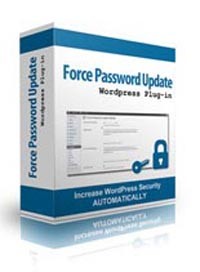
 License Type: Personal Use
License Type: Personal Use  File Size: 273 KB
File Size: 273 KB File Type: ZIP
File Type: ZIP
 SKU: 16109
SKU: 16109  Shipping: Online Download
Shipping: Online Download
"Finally! An Easy Way To Stop The Number One Threat To Your WordPress Website"
Good security starts with your users, but sadly, many simply aren't aware they may be putting YOUR site at risk....
Dear Website Owner,
You hear it every day. Another site has been hacked. Twitter, Zendesk, even new outlets fall victim every single day.
What you don't hear about - unless you're in the security biz - are the hundreds or even thousands of WordPress sites that are hacked every month. The damage can range from mildly irritating to catastrophic.
It's not really the fault of WordPress, or even that of your host. The fact is, armies of malicious hacker bots are out there even as you read this, repeatedly trying to log into unprotected sites - even yours.
And the number one cause? Weak or outdated passwords.
You ARE Being Careful With Your Passwords, Right?
Hopefully you're not making any of the most common password mistakes - the kind that might result in your site being hacked. Hopefully, you use a password manager and choose random, unreadable passwords, and you change them often.
That's just good common sense, whether for your site or someone else's.
But that's not what your users are doing. They're using...
Reused and recycled passwords: If your member uses the same password for her Twitter account as she does for your site, and Twitter gets hacked - you are at risk.
Commonly used passwords: If your member uses any of the hundreds of most commonly used passwords (and you'd be shocked at how many do) - you are at risk.
Easy-to-guess passwords: If your member uses words found in the dictionary - you are at risk.
Well-known letter/number swaps: If your user tries to be clever by simply "disguising" letters as numbers - you are at risk.
Now, obviously, none of these members are actively trying to cause your site to be hacked. They simply don't know the risks. And why should they?
It's not as if they're entering their banking data, or sharing other confidential information with your site. Maybe they're just logging in to leave a comment or watch a training video. As far as they are concerned, security is simply not necessary.
WordPress is NO Help!
WordPress is aware of the risks. They know that weak, recycled, and common passwords represent one of the biggest threats to websites today, but unfortunately, they simply do not have a system in place to prevent it from happening.
Users are allowed to use any password they like, or any length, and change it (or not) any time they want. Further, WordPress will helpfully send the password to new users by email.
Of course, you can ask your subscribers, contributors, and editors to use good passwords and to change them often, but there's no way to enforce that - until now.
- File Size:273 KB
- License: Personal Use
- Category:Softwares & Scripts
- Tags:2013 Personal Use Scripts






